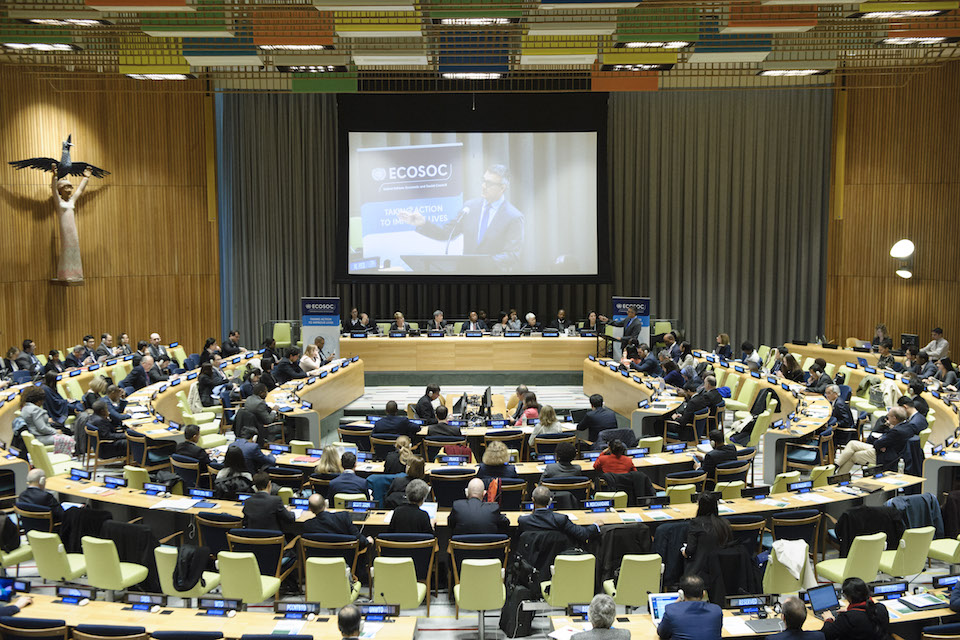"There has been repeated discrimination against NGOs with a human rights focus."
Statement by Ambassador Matthew Rycroft, UK Permanent Representative to the United Nations, ahead of the vote by the Committee on NGOs at the ECOSOC Coordination and Management Meeting.

Thank you for the opportunity to introduce this draft decision, and I would like to begin by thanking Australia, Belgium, Estonia, Germany, Greece, Ireland, Japan, Nigeria, the United States of America and Uruguay for their co-sponsorship, as well as Bulgaria, Italy, Norway and Sweden who co-sponsored from the floor this morning.
As ECOSOC members, we know that the Sustainable Development Goals will only be achieved through the concerted efforts of multiple stakeholders. Among these are non-governmental organisations who bring energy, expertise and fresh perspectives to our work.
The role of the Committee on Non-Governmental Organisations is set out in ECOSOC Resolution 1996/31. We agree that we need a system to review applications received from NGOs for consultative status with ECOSOC. But the aim should be to enable, not to frustrate, the participation of productive, professional civil society organizations.
When a serious and credible NGO such as Christian Solidarity Worldwide is kept waiting in limbo for seven years, the system is clearly not working as it should.
Over those seven years CSW was considered 14 times by the Committee on NGOs. It participated in good faith in question and answer sessions. It responded fully and promptly to more than 80, often repetitive, questions posed by committee members. It undertook bilateral consultations with every NGO committee member. Yet each time it was deferred.
CSW clearly fulfils every requirement set out in Resolution 1996/31. Its work is directly relevant to ECOSOC. It is in full compatibility with the aims and purposes of the UN Charter, as well as the Universal Declaration on Human Rights and other United Nations human rights covenants. CSW works actively to promote the aims and purposes of the Charter. It even trains other civil society partners to work within the UN system and fully utilise UN mechanisms.
The conclusion we draw is that the NGO Committee’s decisions have not been based on the merits of CSW’s application. Those concerns are widely shared. And they have been expressed by several Nobel laureates and dignitaries in letters to this Council.
The United Nations Special Rapporteurs for the freedom of opinion and expression, the freedom of peaceful assembly and association, the situation of human rights defenders, minority issues, and the freedom of religion or belief have also written in support of CSW’s application.
We agree with them that the repeated arbitrary deferrals by the Committee contravene the principles of non-discrimination, equality, participation, transparency and accountability set out in Resolution 1996/31.
CSW does vital work. It promotes the right to freedom of religion or belief set out in Article 18 of the Universal Declaration on Human Rights and developed in other international instruments. It espouses that right in its entirety. CSW advocates for the rights of all peoples to practice their faith, whatever that faith may be, and also the rights of people who profess no religion.
Recent examples of their work include support for the rights of the Rohingya in Burma, or Myanmar, and the rights of civilians of all faiths caught in the cross-fire of conflict in the Central African Republic.
I wish that CSW were an isolated example of an NGO singled out for repeated deferral by the NGO Committee. But sadly that is not the case. There has been repeated discrimination against NGOs with a human rights focus in particular. Yet we know that human rights, including freedom of religion and belief, are essential to build societies which are secure, prosperous and resilient against extremism.
It’s vital that NGOs granted consultative status reflect the full spectrum of issues of concern to ECOSOC and the United Nations. That must include the promotion and protection of human rights, one of the fundamental pillars of the United Nations.
CSW has waited too long for accreditation. It fully meets the criteria this Council has set for consultative status. Its engagement would benefit this Council and the United Nations. That’s why we together with our co-sponsors put forward this draft decision today to grant CSW consultative status.
We do it on their behalf, and on behalf of the many other NGOs whose applications languish in the Committee year after year. We strongly urge positive action by ECOSOC members today to send an uplifting message about the value we attach to NGO engagement and the promotion of human rights.
Thank you.